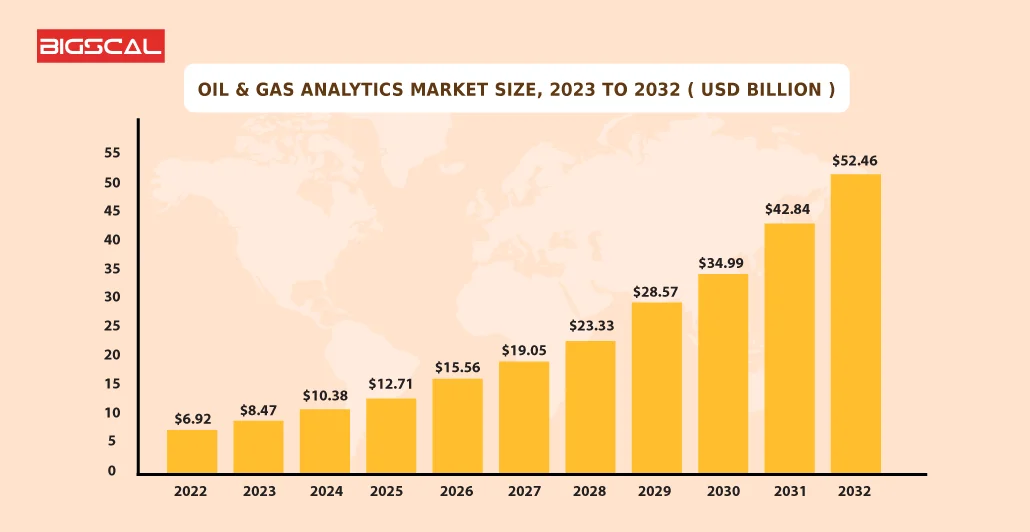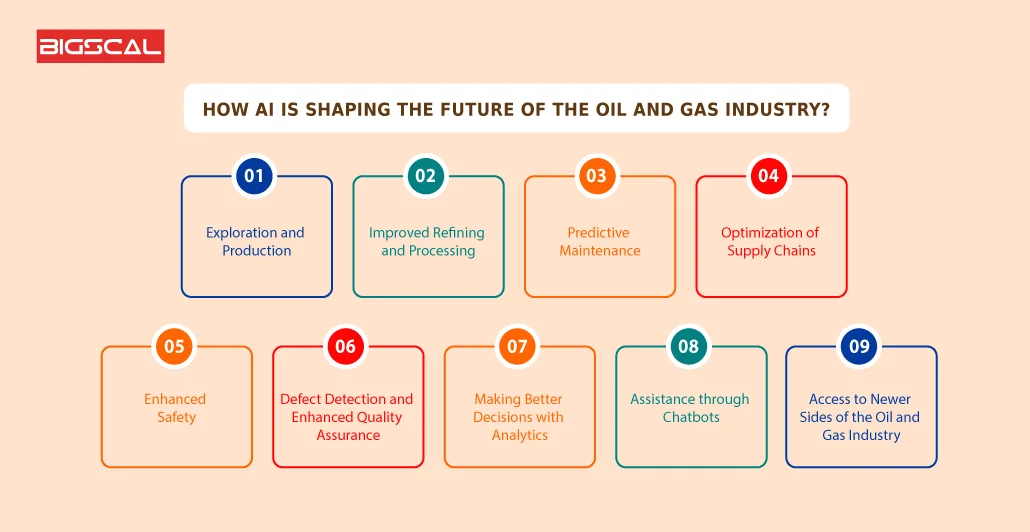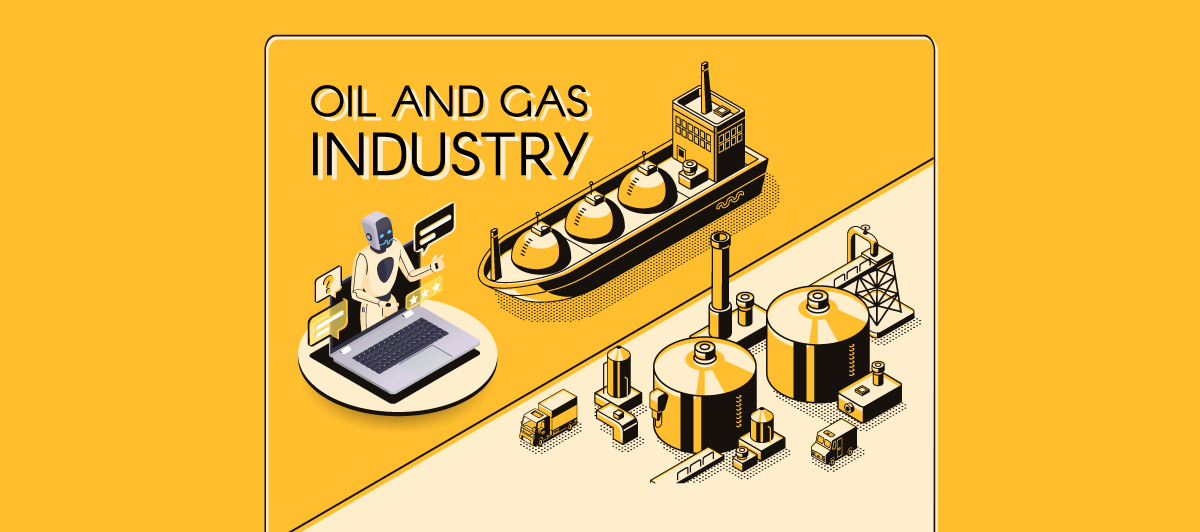The Role of AI in Shaping the Future of Oil and Gas!
Quick Summary: Oil and gas industry is currently on a boom after AI introduction. Wanted to know more about how AI is emerging in the current market. This article is for you. In this article, you will explore the market trends in the oil and gas industry that have emerged after AI’s introduction. A clear and better understanding will be helpful in knowing more about the oil and gas industry trends in detail!
Overview
We are in an era of rapid technological advancements, and AI has emerged as a game-changer, revolutionizing the way we explore, extract, refine, and distribute these energy resources.
As the global demand for energy continues to rise, the oil and gas sector faces complex challenges that require innovative solutions. That’s where AI comes into play, offering immense potential to optimize operations, increase efficiency, and unlock new opportunities.
In this insightful article, we will delve into the role of AI in shaping the future of the oil and gas industry, highlighting its transformative applications and the benefits it brings. This will help you to know what when you reach Gas Industry App Development what you will be going to get.
Whether you’re an industry expert, a curious observer, or someone interested in the intersection of technology and energy, this exploration of AI’s impact on oil and gas will provide you with a comprehensive understanding of how AI is revolutionizing the sector. So, without further due, let’s get started!
About the Role of AI in Shaping the Future of the Oil and gas industry
The oil and gas industry has always been at the forefront of technological advancements, and the integration of artificial intelligence (AI) is no exception. AI is rapidly transforming the oil and gas sector, revolutionizing operations, enhancing efficiency, and reshaping the industry’s future. With its ability to process and analyze vast amounts of data, AI is becoming a game-changer for decision-making processes, cost optimization, and risk management. There are scenarios
One significant area where AI is making a significant impact is in the exploration and production (E&P) phase. AI-powered algorithms can analyze seismic data, well logs, and production history to identify potential drilling locations with higher accuracy.
By leveraging machine learning techniques, AI is Transforming the Oil and Gas Industry and also helps in predicting reservoir characteristics, optimizing well placement, and even predicting equipment failure, leading to improved production rates and reduced downtime. But we cannot forget that this is not limited to here only.
There are tons of best-paying jobs in oil and gas industry. Roles such as petroleum engineers, drilling engineers, and project managers command lucrative compensation due to the specialized skills required and the demanding nature of the work. With high global energy demand, these positions provide excellent earning potential within the industry.
There are some other spheres as well where it is playing a major role and these are here discussed in detail!
Statistics for the Oil and gas industry in terms of market size
If we focus on the growth of the market size of the oil and gas industry there is growth that has been noticed. As per research, it is as follows:

How AI is shaping the future of the Oil and gas industry?

There are several applications that are a must to know and these are as follows:
Exploration and Production:
AI is playing an important role in optimizing exploration and production activities. With the help of artificial intelligence in the oil and gas industry and machine learning techniques, AI can analyze vast amounts of geological data, seismic surveys, well logs, and production history to identify potential drilling locations and estimate reserves more accurately. This enables companies to make informed decisions and maximize the success rate of drilling operations.
When the companies are in a state to make informed decisions, they will be able to implement the strategies accordingly and gain insights as well.
Improved Refining and Processing:
AI is being used to enhance refining and processing operations in the oil and gas industry. AI algorithms can optimize process parameters, monitor equipment performance, and predict equipment failures, resulting in improved efficiency, reduced downtime, and enhanced product quality. AI-powered systems can also optimize the blending of crude oil to achieve desired specifications and minimize costs.
You might feel like this is something that is not possible. But with the emergence of AI, it is possible, and more and more AI-compatible machines are there focusing on it. The parameter is set up as per the standards and changes can be made accordingly.
Predictive Maintenance:
AI enables predictive maintenance by leveraging sensor data, real-time monitoring, and machine learning algorithms. With the help of analyzing equipment data, AI systems can detect patterns and anomalies that indicate potential failures or maintenance requirements. This proactive approach allows operators to schedule maintenance activities in advance, minimizing unplanned downtime and reducing maintenance costs.
When these things are planned businesses will be able to adapt the measures as needed and prevent the failures as well. There will be no need for them to face failure when things are planned accordingly.
Optimization of Supply Chains:
AI technologies or say Digital Transformation in Oil & Gas Industry facilitate the optimization of supply chains in the oil and gas industry. By integrating data from various sources, including production, transportation, and market demand, AI algorithms can optimize inventory levels, logistics routes, and delivery schedules. This improves overall supply chain efficiency, reduces costs, and ensures timely delivery of products.
The improvement in the overall supply chain will help the business to predict what they need to do in the future and in which respect. This will also turn out to be helpful in predicting the growth in a better way.
Enhanced Safety:
AI is improving safety measures in the oil and gas industry through the analysis of real-time data from sensors, cameras, and other monitoring devices. AI systems can detect potential safety hazards, such as leaks, equipment malfunctions, or abnormal operating conditions, and alert operators in real time. This enables proactive interventions to prevent accidents and ensures a safer working environment for personnel.
Defect Detection and Enhanced Quality Assurance:
AI-based image recognition and pattern detection algorithms are being used to identify defects and anomalies in equipment, pipelines, and other infrastructure. By analyzing images and sensor data, AI systems can identify corrosion, cracks, and other potential issues that may affect the integrity of assets. Early detection allows for timely maintenance and quality assurance, reducing the risk of failures and accidents.
Making Better Decisions with Analytics:
AI-powered analytics platforms enable oil and gas companies to make better-informed decisions. By analyzing vast amounts of data from multiple sources, including exploration, production, refining, and market trends, AI algorithms can provide insights and predictions that support decision-making processes. This allows companies to optimize operations, reduce costs, and identify new business opportunities.
Assistance through Chatbots:
AI-powered chatbots are being used in the oil and gas industry to provide assistance and streamline interactions with customers, employees, and stakeholders. Chatbots can handle routine inquiries, provide technical support, and even guide users through complex processes. This improves operational efficiency and enhances customer satisfaction.
Access to Newer Sides of the Oil and Gas Industry:
AI is opening up new avenues in the oil and gas industry. For example, AI algorithms are in use to analyze satellite imagery and other data sources to identify potential exploration areas that were previously overlooked. AI is also facilitating the extraction of unconventional resources, such as shale gas and oil sands, by optimizing drilling techniques and production processes.
How Bigscal can help you out?
At Bigscal we are utilizing top-notch technologies that are not only favoring your business in terms of growth but also help you to stay ahead in the market. It doesn’t matter in which sphere you need the support we are always here to help you out.
Also, on top of everything else, we have a dedicated team of Oil And Gas Software Development Services experts who will cater to all your business needs and offer the services accordingly. There is no need for you to feel stuck at a point because with us you will have the services as needed. What are you waiting for?
Without further due, reach us now and avail of the services as needed. For sure after availing our services from us you will feel relaxed and have the best services on your side!
Conclusion
In conclusion, it is evident that AI is significantly shaping the future of the oil and gas industry. The implementation of AI technologies in this sector has revolutionized various aspects, including exploration, production, safety, and operational efficiency.
AI-driven algorithms and machine learning techniques have empowered oil and gas companies to make more accurate predictions, optimize resource extraction, and reduce operational costs. Make sure you are reaching the best Oil And Gas Software Development Company that will cater to your project needs. Also, do let them know about the needs you have in your mind regarding the project so that they will provide you with the services as needed!
FAQ
What is the role of AI in the oil and gas industry?
AI plays a significant role in the oil and gas industry by enabling advanced data analytics, predictive modeling, and automation. It helps optimize exploration and production processes, improves safety, reduces operational costs, and enhances decision-making capabilities.
How does AI contribute to exploration and production in the oil and gas sector?
AI enables geoscientists and engineers to analyze vast amounts of data from seismic surveys, well logs, and production records to identify potential drilling locations, predict reservoir characteristics, optimize well design, and maximize hydrocarbon recovery. AI algorithms can also monitor equipment performance and identify maintenance needs, minimizing downtime.
Can AI help improve safety in the oil and gas industry?
Yes, AI can enhance safety in various ways. It can analyze sensor data in real-time to detect anomalies and predict potential equipment failures, helping prevent accidents. AI-powered drones and robots can also be in need of hazardous inspections and monitoring tasks, reducing risks to human workers.
How does AI contribute to environmental sustainability in the oil and gas sector?
AI helps optimize energy usage and reduce environmental impact by identifying opportunities for energy efficiency, waste reduction, and emissions management. It can analyze data from sensors and IoT devices to identify inefficiencies in operations and recommend strategies for minimizing environmental footprints.
What are the challenges and limitations of using AI in the oil and gas industry?
While AI offers numerous benefits, challenges remain. One major obstacle is the availability and quality of data, as AI models require large and accurate datasets for training. Integration of AI technologies into existing workflows and systems can also be complex. Additionally, ensuring data privacy and addressing ethical concerns related to AI decision-making are crucial considerations.









